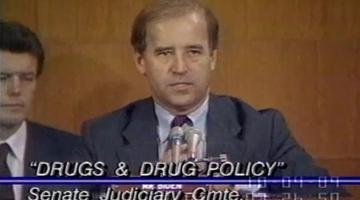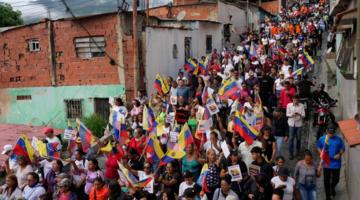Vehicles are left stranded on a flooded Interstate 45 in Houston in May 2015. The interstate's construction nearly 50 years ago ripped apart the Acres Homes area north of Houston. (Aaron M. Sprecher/AFP via Getty Images)
Half of the projects funded through the law have been allocated to expanding highways.
Originally published in Capital B.
Nearly 45 years ago, the Acres Homes area north of Houston was the largest unincorporated Black community in the South, a thriving 9-square mile area where homeownership was the norm. That was until the city of Houston annexed it, and the Interstate 45 highway was built through its heart.
In the aftermath, the community’s poverty rate has jumped to almost double the city’s average, and health ailments from pollution have increased.
President Joe Biden’s Bipartisan Infrastructure Law, one of the nation’s most significant investments in curbing climate change, was supposed to consider the history of areas like Acres Homes in an attempt to make communities whole again.
By creating a pathway to building the clean energy economy, from expanding electric school bus fleets to subways and mass transit options, it would also serve as a way to reverse the well-documented history of how the country’s highways ripped apart Black communities. As residents were displaced, homeownership chances were stunted, and Black people were left overexposed to pollution from cars and trucks and became most likely to die in car crashes.
Instead, the law is actually increasing pollution and contributing to the continued disruption and displacement of Black communities, according to a new report by the climate policy group Transportation for America.
According to the new report, what has primarily happened is a repeat of that history: freeways, highways, and more roads. Out of the more than 55,000 projects totaling roughly $130 billion implemented through the $1.2 trillion spending package, nearly half of the spending has been allocated to highway expansion.
However, less than three weeks following the report’s release, the Biden administration announced a $3.3 billion spending plan to “reconnect and rebuild communities” in more than 40 states disconnected by highways throughout the 20th century. Some of the spending’s most prominent focuses include Milwaukee, Atlanta, and Los Angeles, where public transit options will increase and some highways will be capped.
Still, the spending pales in comparison to recent allocations to expand freeways.
Last year, the Biden administration supported a nearly $10 billion expansion of that same highway that tore through Acres Homes. The expansion led to the demolition of almost 1,000 homes in a majority Black and Latino community.

The widening of Houston’s Interstate 45 highway expands a decades-long displacement of the region’s Black middle class, transit advocates said. (Courtesy of Adam Paul Susaneck and Segregation by Design)
It’s a mistake we’ve seen time and time again in this country, said Cherrelle J. Duncan, director of community engagement at LINK Houston, a policy organization focused on improving transit options in Houston’s Black and brown communities.
“Highways and expanding them don’t make your communities easier or lessen traffic. It doesn’t make your cars move faster,” she explained. “All it does is increase our air pollution, our noise pollution, and it also just terribly affects Black communities and brown communities by pulling resources, and also making them quite literally bypass and drive right past our communities.”
A study by Air Alliance Houston, a nonprofit environmental justice group, found that levels of benzene, a carcinogen, will more than double at some schools along the expanded highway.
Nationwide, the highway investment will practically wipe out any positive climate benefits from other spending priorities. The simple result, the report found, is that the U.S. will generate more emissions from transportation, already its largest source of planet-heating gases, than if the bill hadn’t ever passed. By 2040, the pollution created from these projects will be equivalent to running 48 coal-fired power plants a year.
The spending so far has created a “climate time bomb” that will also perpetuate the displacement of Black communities, the report concluded.
It is even known to exacerbate climate concerns, like in Elba, Alabama, where Capital B reported on how a new highway expansion intensified a flooding crisis in a rural Black community, leading to fears that residents would be flooded out of their homes and displaced.
Last month, a coalition of 200 climate organizations called for a national moratorium on highway expansions, particularly due to the harm they’ve caused in Black and brown communities.
“We’re seeing how infrastructure literally tears us apart,” Duncan said. “We’ve created a division between communities so that we’re no longer able to interact with each other while making it harder to build climate resilience, to stop floods, or flee in times of disaster.”
Why does this keep happening?
While the Department of Transportation under the Biden administration recommended that states prioritize repairing roads over expanding them and urged states to consider the impact on communities of color reeling from decades of division by highways, the spending bill granted states considerable discretion in allocating funds.
As with many of Biden’s policies, it prompted a backlash from Republicans in Congress and was mostly overlooked by states such as Texas and even California, which received the most funds through the spending bill. At the same time, there has been little interest in improving access to public transit, which has taken a hit nationwide after the pandemic lowered commuter revenue.
In Houston, Duncan has seen firsthand how the country’s renewed investment in highways over other transit options is disrupting a new generation of Black children.
“If you have car-centric infrastructure,” Duncan said, “you’re simply going to have significantly worse air pollution, going to have more car crashes, and it’s all going to be centered in Black communities.”
As Capital B reported last year, Black people are almost twice as likely as white people to die in car crashes.

The struggle to reconnect communities
There have been attempts nationwide to reconnect Black communities disrupted by freeways. In Detroit, for example, where a vibrant Black community was destroyed for a highway in the 1950s, there is a plan to eliminate the highway. The Biden administration has allocated $105 million to the project.
However, the plan is to replace the highway with a street that is six lanes wide and divided by a median for most of its length. Transit advocates say the current design is still too focused on the concerns of drivers.
This pathway of “boulevardization” in communities disturbed by highways has been the main tactic implemented by cities across the country. This approach involves removing highway structures entirely and replacing them with urban boulevards, but as in the case of Detroit, it can still prioritize cars rather than city residents. In some cases, it has even led to gentrifying and displacing the very communities it aims to support.
One of the earliest examples of boulevardization, which took place in Oakland, California, in the early 1990s and has been used as a prime example of the process’s success, actually led to the neighborhood’s Black population dropping by a third as the median household income increased by 55% between 1990 and 2010.
 One of the earliest examples of boulevardization, which took place in Oakland, California, in the early 1990s and has been used as a prime example of the process’s success, actually led to the neighborhood’s Black population dropping by a third as the median household income increased by 55% between 1990 and 2010.
One of the earliest examples of boulevardization, which took place in Oakland, California, in the early 1990s and has been used as a prime example of the process’s success, actually led to the neighborhood’s Black population dropping by a third as the median household income increased by 55% between 1990 and 2010.
It’s a perfect example of intention never being actualized because Black communities aren’t being listened to, Duncan said.
“It’s critically important for every agency and city organization to involve diverse voices when it comes to planning transportation,” Duncan said. “If you are going to actively rip apart our communities and actively separate them by highways, the least that you can do is truly listen and engage them to ensure that these project fixes and policies don’t overlook us again.”
Over the past year, Duncan’s organization has worked to collect community input for similar highway removal attempts and calls for investment in walkability and public transit; she hopes leaders will listen.
Adam Mahoney is the climate and environment reporter at Capital B. Twitter @AdamLMahoney.



















